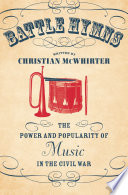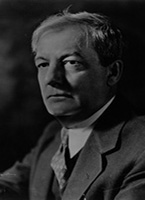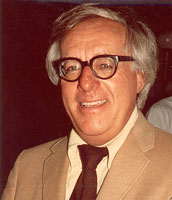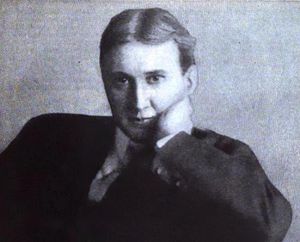
Christian McWhirter
Born: 1978 in North York, Ontario, Canada
Pen Name: None Connection to Illinois: McWhirter moved to Springfield, Illinois, in 2013 to work at the Abraham Lincoln Presidential Library as part of the ''Papers of Abraham Lincoln'' project. Biography: Christian McWhirter is an Assistant Editor for ''The Papers of Abraham Lincoln'' and Editor of the ''Journal of the Abraham Lincoln Association''. His first book, ''Battle Hymns: The Power and Popularity of Music in the Civil War'' (2012) was a selection of the History Book Club. He has also written articles for the ''New York Times Disunion'' blog, the ''Blackwell's Companion'' series, and ''Civil War Monitor''.
Awards:
- -- History Book Club Selection, ''Battle Hymns''
Christian McWhirter on WorldCat : http://www.worldcat.org/search?q=christian+mcwhirter
Selected Titles
| Battle hymns : ISBN: 1469613670 OCLC: 748812934 University of North Carolina Press, Chapel Hill : ©2012. "Music was everywhere during the Civil War. Tunes could be heard ringing out from parlor pianos, thundering at political rallies, and setting the rhythms of military and domestic life. With literacy still limited, music was an important vehicle for communicating ideas about the war, and it had a lasting impact in the decades that followed. Drawing on an array of published and archival sources, Christian McWhirter analyzes the myriad ways music influenced popular culture in the years surrounding the war and discusses its deep resonance for both whites and black, South and North ... Though published songs of the time have long been catalogued and appreciated, McWhirter is the first to explore what Americans said and did with these pieces. By gauging the popularity of the most prominent songs and examining how Americans used them, McWhirter returns music to its central place in American life during the nation's greatest crisis. The result is a portrait of war fought to music."--Jacket. |
|
 |
Battle hymns : ISBN: 0807882623 OCLC: 780371018 University of North Carolina Press, Chapel Hill : ©2012. Music was everywhere during the Civil War. Tunes could be heard ringing out from parlour pianos, thundering at political rallies, and setting the rhythms of military and domestic life. With literacy still limited, music was an important vehicle for communicating ideas about the war, and it had a lasting impact in the decades that followed. Drawing on an array of published and archival sources, this book analyses the myriad ways music influenced popular culture in the years surrounding the war, and discusses its deep resonance for both whites and blacks, South and North. |
| On Lincoln's mind : ISBN: 0942579267 OCLC: 862817286 Illinois Historic Preservation Agency, Springfield, Ill. : ©2013. When the last gun fired at Gettysburg on July 3, 1863, few understood what the battle meant to the conduct of the war or the Union cause, including Abraham Lincoln. Surely, Lincoln was elated to learn that his long-beleaguered Army of the Potomac had finally won a significant victory against Robert E. Lee's Army of Northern Virginia but it would be 139 days until the President visited the field and made his famous, cogent, and concise summation of the war's cost and promise for America. During that time span, Lincoln considered a host of issues and contended with numerous voices competing for his attention. Indeed, the hundreds of letters he received presented a perfect cacophony of requests, reports, complaints, and commendations. The pages that follow include examples of the correspondence sent to and by Lincoln between July 4 and November 19, 1863. They illustrate how the nation spoke to its leader in a time of crisis and how difficult it must have been for Lincoln to navigate such a range of issues and still complete the "unfinished work" of the men who died on that battle field -- p. 1. |
|
 |
On Lincoln's side : ISBN: 9780942579116 OCLC: 894677058 Illinois Historic Preservation Agency, Springfield, Ill. : ©2014. 1864 was the last critical year of the Civil War for the Union and perhaps no other event was as critical as Abraham Lincoln's reelection. The United States had never seen an internal crisis of the Civil War's magnitude and some northerners doubted that holding a presidential election in the midst of such internal division was even appropriate. Lincoln, however, recognized that conducting a national election was both symbolic and necessary in a war that tested whether a nation, conceived in liberty could long endure. Indeed, Lincoln's election as president in 1860 had been the initial spark for secession and his belief that breaking up the nation simply because a presidential election did not turn out the way a particular state desired was the essence of anarchy. So, the 1864 election came and the fate of the nation potentially hung in the balance. Nineteenth-century elections were not like those today. Few politicians actively campaigned for themselves and instead stood for office, letting others speak for them. Thus, Lincoln did not stump much in the summer or fall of 1864 and left such duties to other Republicans. However, the reelection campaign influenced almost every aspect of the presidency, including the conduct of the war. Whatever issue Lincoln confronted, he always had an eye toward how it would affect his chances in November. This collection of letters to and by Lincoln illuminates the various aspects of his administration and how they influenced, or were influenced by, the election process. |




